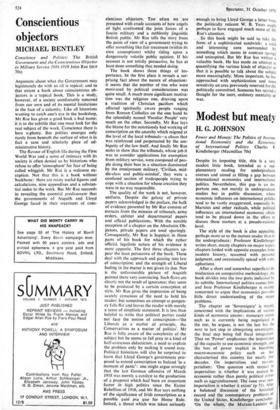Conscientious objectors
MICHAEL BENTLEY
Conscience and Politics: The British Government and the Conscientious Objector to Military Service 1916-1919 John Rae (out. 70s) Argument about what the Government may legitimately do with us all is topical; and to that extent a book about conscientious ob- jectors is a topical book. This is a study, however, of a society comfortably removed from our own and of its mental limitations in the face of a calamity. Like all historians wanting to catch one's eye in the bookshop, Mr Rae has given a good book a bad name; it is to the subtitle that one must look for the real subject of the work. Conscience there is here a-plenty. But politics emerges only rarely from beneath the surface of what is in fact a sane and scholarly piece of ad- ministrative history.
The flavour of English life during the First World War and a sense of intimacy with its society is often denied us by historians who refuse to offer 'atmosphere' for fear of being called whiggish. Mr Rae is a welcome ex- ception. Not that this is a book without backbone: there are many useful figures and calculations, nine appendixes and a substan- tial index to the work. But Mr Rae succeeds in revealing the essential predicament that the governments of Asquith and Lloyd George faced in their treatment of cons- cientious objectors. Too often we are presented with crude accounts of how angels of light confronted the joint forces of a fascist military and a ruthlessly jingoistic British publk. Mr Rae tells the story from the point of view of a government trying to offer something like fair treatment (within its own assumptions) whilst riding upon a dangerously volatile public opinion. If his account is not totally persuasive, he has at least done something that needed doing.
The book shows three things of im- portance. In the first place it reveals a sur- prising fact about the nature of objection: it seems that the number of cos who were motivated by political considerations was quite small. A much more significant motiva- tion was the religious one, drawing upon a tradition of Christian pacifism which affected spiritually aware people ranging from Roman Catholics on the one hand to the splendidly named 'Peculiar People' very much on the other. Secondly, Mr Rae lays the blame for the notoriously bad working of conscription on the anarchy which reigned at the level of the local tribunals—a chaos that was reinforced and perpetuated by the am- biguity of the law itself. And finally Mr Rae seeks to show that the tribunals, whose job it was to consider applications for exemption from military service, were composed of peo- ple doing their best in a situation dominated by the omnipresent military. 'Civilian, mid- dle-class and public-minded', they were a confused section of tradespeople trying to cope with a situation for whose creation they were in no way responsible.
The quality of the work is not, however, uniform. Despite the galaxy of private papers acknowledged in the preface, the bulk of evidence presented by Mr Rae consists of extracts from the minutes of tribunals, army orders, cabinet and departmental papers and official publications. With the notable exception of a chapter on the Absolutist Ob- jectors, private papers are used sparingly. Consequently, Mr Rae is happiest in those parts of his book for which the rather official, legalistic nature of his evidence is most apposite. The first three chapters ap- pear the least persuasive of the book. These deal with the approach and passing into law of conscription; and the strength 'of Liberal feeling in the matter is not given its due. Nor is the unfavourable picture of Asquith painted there very convincing. Such flaws are clearly not the result of ignorance; they seem to be produced by a certain conception of style. Mr Rae gives the impression of being acutely conscious of the need to hold his reader; but sometimes an attempt at pungen- cy falls flat and leaves the reader with merely a sense of simplistic statement. It is less than helpful to write that political parties could not face the notion of conscription—`the Liberals as a matter of principle, the Conservatives as a matter of politics'. Mr Rae is fully aware of the complexity of the subject but he seems to fall prey to a kind of half-conscious didacticism, a need to explain the problem only by making it sound easy. Political historians will also be surprised to learn that Lloyd George's government pro- posed to extend conscription to Ireland 'in a moment of panic': one might argue strongly that the last German offensive of March 1918 was merely a catalyst to the production of a proposal which had been an important factor in high politics since the Easter
Rebellion of 1916, and Mr Rae says nothing of the significance of Irish conscription as a
possible quid pro quo for Home Rule. Indeed, a threat which was taken seriously enough to bring Lloyd George a letter from the politically reticent W. B. Yeats ought perhaps to have engaged much more of Mr Rae's attention.
So this book might be said to take the form of a sophisticated sandwich: a solid and interesting core surrounded by something which seems in contrast spongy and uninspired. But Mr Rae has written a valuable book. He has made an attempt at quantifying the various kinds of objector so that it is possible to talk about the subject more meaningfully. More important, he has approached with sophistication and some sensitivity an area previously reserved for the politically committed. Someone has spared a thought for the inert, ordinary mentality of war.










































 Previous page
Previous page